Feb 07, 2026
Feb 07, 2026
Abstract
Where there is life, there is literature which reflects colors and its shades. Colors have their own theories which explain how the human beings perceive and respond to them. Every literature is the literature of such a life that may be colorful or colorless. In both conditions they have their shades. Present article aims to examine the various shades of life presented in Rajender Krishan’s collection of the poems, entitled, Wanderer. First of all, a little effort is made to define the phrase ‘shades of life’ separately and collectively—shades, shades of, and shades of life. Then, an attempt is made to present the review of the related literature. Later on, it explores how Wanderer is a wanderer into life, and how he is a wanderer from life. To examine the aspect of wandering into life, it aims to glance over the mental, emotional, physical, spiritual, and social condition of the contemporary men as presented in this collection. While for examining the aspect of wandering from life, it explores the causing factors of Wanderer’s detachment from the world. After that, whether wanderer or Ramta Jogi is subjective or objective in his deliverance of the sermons is also a thing of great consideration. Finally, his nature of combining and balancing the oxymoronic things in life is also the concern of the present article.
Key Words
Hiatus, Nudging, Resilience, Ennui, Onus, Imbibe, Soi-distant, Sychophant, Facet, vibes
Rajender Krishan Chowdhry (b. 1951) also known as ‘Aka Raj Chowdhry’ is a significant poet of the USA (New York). India is in his blood. His roots are here. Although he migrated to America from India, his native land, in 1989, he could not forget it. His works are directly or indirectly the witness of this secret. By now, he has penned three poetry collection, namely, Solitude, Amma’s Gospel, and Wanderer which emit out knowledge and wisdom in the service of humanity. Still he is serving the masses as well as the writers with his literary website Boloji.com. He has a great passion not only for the mystic poet Kabir, but also for the photography to bring right back the enchanted feelings, sounds and fragrance of the particular thing of a particular moment to all.
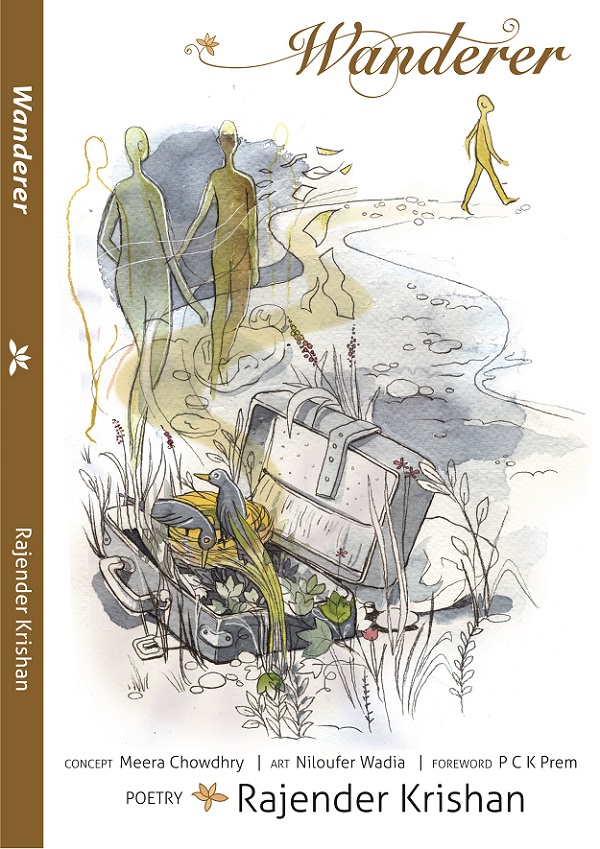 Wanderer (pub. 2021) is the third creation of his pen, the other being Solitude, and Amma’s Gospel. While reading these gems of poetry, one may be undoubtedly reminded of Indian Hindi writer Rahul Sankrityayan’s essay “Athato Ghumakkad Jigyasa”, Khalil Gibran’s prose pieces of parables and sayings Wanderer, William Wordsworth’s first book of The Excursion “Wanderer” besides a famous lyric “Daffodils”, Albert Camus’ The Outsider or The Stranger. To have the glimpses of Ralph Waldo Emerson, the American saint poet, is never missed for the readers. As in “Athato Ghumakkad Jigyassa”, Sankrityayan describes wandering as the best thing of the world because of its nature of providing the treasure of great knowledge and wisdom to the world not only in the halcyon days but also in the days of blood and tears. In the same way in Wanderer, Rajender Krishan, the poet, describes the gems of the philosophical wisdom with the aim of helping the crying and bewildering masses amidst the uncertainties and anxieties of the pandemic days. Dissimilarity resides in similarity and similarity in dissimilarity— is common with Wanderer of K. Gibran and of Rajender Krishan. Observing this, Prof. R.K. Bhushan Sabharwal , a poet, author, and critic writes:
Wanderer (pub. 2021) is the third creation of his pen, the other being Solitude, and Amma’s Gospel. While reading these gems of poetry, one may be undoubtedly reminded of Indian Hindi writer Rahul Sankrityayan’s essay “Athato Ghumakkad Jigyasa”, Khalil Gibran’s prose pieces of parables and sayings Wanderer, William Wordsworth’s first book of The Excursion “Wanderer” besides a famous lyric “Daffodils”, Albert Camus’ The Outsider or The Stranger. To have the glimpses of Ralph Waldo Emerson, the American saint poet, is never missed for the readers. As in “Athato Ghumakkad Jigyassa”, Sankrityayan describes wandering as the best thing of the world because of its nature of providing the treasure of great knowledge and wisdom to the world not only in the halcyon days but also in the days of blood and tears. In the same way in Wanderer, Rajender Krishan, the poet, describes the gems of the philosophical wisdom with the aim of helping the crying and bewildering masses amidst the uncertainties and anxieties of the pandemic days. Dissimilarity resides in similarity and similarity in dissimilarity— is common with Wanderer of K. Gibran and of Rajender Krishan. Observing this, Prof. R.K. Bhushan Sabharwal , a poet, author, and critic writes:
While reading the text of Rajender Krishna’s Wanderer, I was reminded of another great book of classical wisdom, Wanderer by Kahlil Gibran….Both the books shine by contrast in their own way for the one has short prose pieces as allegories and parables and convey the essence of philosophical wisdom for everyday human life; the other is a book of short poems in which the poet is grappling with the urgent confrontations, dualities of mind and spirit, intellect and the soul, in the context of bodily needs and pleasures in daily human life and quest for the supreme since ages dealt with by the seers and sages in all literatures, even in scriptures (p.259).
Not to talk about the dissimilarities between “Wanderer” of Wordsworth and of Rajender Krishna, there is to talk, but only about the consisting similarities. Both of the works describe the pathetic story related to humanity— the former of the Napoleonic war, while the latter of the pandemic days. Here, another interesting point is that in Rajender’s Wanderer, wanderer or ramta Jogi starts his journey as aimlessly as Wordsworth’s persona in the poem “Daffodils”. Seeing this similarity, Hema Ravi, an academic and poet from Chennai writes:
The title ‘Wanders’ instantly flashes thoughts of William Wordsworth’s immortal lines-‘I wandered lonely as a cloud….’ Referring to the wandering without a purpose until the poet spies ‘a host of daffodils.’ Although the wanderings of poet Rajendra Krishn appear to begin aimlessly ‘with a churning of fleeting thoughts,’ it primarily aims to ‘ascertain the destination;’ in Wordsworth’s language, to feel that ‘bliss of solitude’ (p.273)
Whether to talk about Albert Camus’ The Stranger or about Rajender Krishan’s Wanderer, tense is same. Both the works present the predicament of human beings living an uncertain life that is blended with authenticity and un-authenticity of the self in the midst of an absurd world. When the thing is related to the philosophical view of life, the glimpses of Ralph Waldo Emerson are also common in Wanderer of Rajender Krishan. Like Emerson, India—especially The Gita—is directly and indirectly present in the crux of his works.
No doubt, literature has always been mirroring the society for ages and ages. The literary men have never failed in this process of mirroring the society in their creations. Life is the indistinguishable part of the literature. Being a distinguished poet, Rajender is never away from this process of mirroring life in his creations. The ideas that are found in his literary world are rooted in the experiences of his life. Minutely, he observes the world, but without pronouncing any judgment. Why to make sound, when silence is greater and mightier. Without any doubt, his poetic pieces are brimming with the seven-colors of life. Sometimes, he writes about the pains and pangs of men’s soul, and sometimes about their society and the world in which they live. The world that surrounds them, is vividly presented in his works philosophically.
Without mentioning Shakespeare, the Bard of Avon, it seems impossible to explore the various shades of life in Wanderer of Rajender. For William Shakespeare has described them in the seven stages of man’s life in his play As You Like It. Rajender has also done something like that. He too has depicted them. Although like Shakespeare, he has not categorized the life into any stage, its various shades are visible throughout his works. Sometimes they are dim, and sometimes bright. But they are there where they are needed. Their presence can’t be neglected. Describing these various shades in the various stages of man’s life, Shakespeare enchantingly writes:
All the world’s a stage
And all the men and women merely players;
They have their exits and their entrances,
And one man in his time plays many parts,
His acts being seven ages, At first the infant,
Mewing and puking in the nurse’s arms;
And then the whining schoolboy, with his satchel
And shining morning face, creeping like snail
Unwillingly to school. And then the lover,
Sighing like furnace, with a woeful ballad
Made to his mistress’ eyebrow. Then a soldier,
Full of strange oaths, and bearded like the pard,
Jealous in honor, sudden and quick in quarrel,
Seeking the bubble reputation
Even in the cannon’s mouth. And then the justice
In fair round belly with good capon lined,
With the eyes severe and bread of formal cut,
Full of wise saws and modern instances;
And so he plays his part. The sixth age shifts
Into the lean and slippered pantaloon,
With spectacles on nose and pouch on side;
His youthful hose, well saved, a world too wide
For his shrunk shank; and his big manly voice,
Turning again toward childish treble, pipes
And whistles in his sound, Last scene of all,
That ends this strange eventful history,
Is second childishness and mere oblivion,
Sans teeth, sans eyes, sans taste, sans everything (p.83).
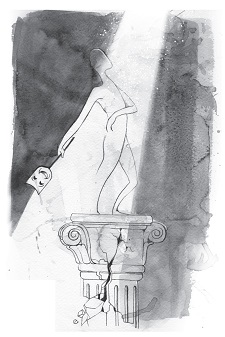 In the poem “Insight” through the mouth of wanderer, the poet also says something like Shakespeare:
In the poem “Insight” through the mouth of wanderer, the poet also says something like Shakespeare:
Life is a play
The world a stage
And we all actors
So affirm the seers (“Insight”, Wanderer.p.53).
Although Rajender, unlike Shakespeare, has not presented any stage of life in Wanderer, Shakespearean glimpses are common in him. They have a little similarity in the presentation of the various shades of the various stages of man’s life. He, chiefly deals with the third, fourth, and fifth stages of Shakespeare’s man’s life. He too, like him, describes such a world where people are full of strange oaths, jealous of others’ honor, pining for bubble reputation, quick in quarrel, and seeing modern instances without any sense of their ‘self’ and its authenticity. The rest shades of life that Shakespeare presents in the rest stages of man’s life, are also not neglected. They have a little place but great position. Their contextual glimpses have a good existence, but occasionally and continually.
Why—why to be crazy for the seven stages of life presented by Shakespeare? In the ancient texts and scriptures of the Hindus, the four Ashramas—a system of the stages of life besides being a facet of Dharma—have been discussed. Out of these four ashramas, Brahmcharya is for the students, Grihastha for the householders, Vanaprastha for the forest dwellers, and Sannyasa for the renunciates. Rajendra’s mystic, Wanderer, is undoubtedly the passer of Vanaprastha and Sannyasa. The deep knowledge and wisdom that he presents, reveal that he has already crossed the Asharams of Brahmcharya and Grihastha. The third and the fourth stages of life that the RAMTA JOGI presents, is only for the spiritual libration for the well being of the world. No doubt, he is doing his best for the betterment of the world and its people.
After having a little glance over the related literature, there is need to have a glance over the concept ‘various shades of life’. ‘Shade’ is the first word of the phrase that denotes various things but chiefly ‘to color so that the shades may pass gradually from one to another’ as well as ‘a facial expression of sadness and displeasure’ (web.). While, the ‘shades of ’, According to Webster dictionary, (is) — “used to say what or who one is reminded of when looking at or thinking about someone or something” (web.). But ‘the various shades of life’ tell the tales of the exploitations, struggles, complications, miseries and social issues of the people of the wasteland who deal with loss, regret, and life’s harsh realities all in the name of pseudo culture and civilization, spirituality and modernity. Generally, it stands for the blending of both the feeling and emotions of pains and pleasures, optimistic and pessimistic outlooks towards life and its sphere, people’s high and low morality, the existence and essence of the individual as well as of the mass, their outlook on science and nature. In other words, it is not only about right or wrong, but observation and perception; it is not only about truth or falsification ; but time and coincidence; it is not only about success or failure; but choice and free will; it is not only about yes or no, but subjective and objective. But the question why to study the various ‘shades of life’ is answered well by Vasundhara Raghavan and Dr. Mohammad Akmal in the ‘blurb’ of the novel Shades of Life: Sublime Joy is in Living (2018). Here, they write: “the ultimate purpose of Shades of Life is to prepare others to meet such exigencies of renal failure, and to help them find a life saving solution” (Blurb).
It seems that the saying ‘life is not always black and white, it’s a million shades’ is near and dear to the poet of Wanderer. He has depicted life’s millions shades of 21st century in this volume. The various shades of life whether they are good or bad, whether bitter or sweet, whether colorful or colorless, all— all are lying in the fathom of this oceanic collection. Undoubtedly, it can be said that to see the things from both sides needs an open mind. The mystic of Wanderer is an open minded man with great knowledge and wisdom. He sees the things from the both sides and tries to imbibe both the poison and nectar of life. Such a type of his nature, consequently, makes him a wanderer into life and a wanderer away from life. A well disciplined diver can still explore it, but with a great endeavour and patience. Seeing Wanderer’s wandering into life, Dr. Sulakshna Sharma, an author, an editor, a critic, and a reviewer writes:
A wanderer or Ramta Jogi is the gatherer of ideas: ideas that are rooted in the experiences of life. He is like a bird in flight: observing the world without judgment. Sitting in a living room fitted with all the possible technologies of the world, one is winged enough to wander. What come in the of such a ‘meditative,’ ‘wandering,’ ‘warrior’ of a mystic in 21st century is well-stated in Wanderer of Rajender Krishan (p.245).
Describing the wishes of the poet, in the ‘Foreword” of the collection of the poems Wanderer, P C K Prem writes: “It is a wish of the poet to carry on efforts to explore new pastures to obtain fulfillment in life in uncertain and thorny times where the journey will be enigmatic, and the co-traveler will be equally a stranger, unknown where if a man is true, life is meaningful” (p.15). No doubt, the worst time of Corona pandemic revealed the bitter reality of life. The complexities of time and the strangeness of the fellows gave a new meaning to it. It naturally proved that none belongs to anyone. This is the same thing that makes Rajender an eccedentesiast. He tries lots to put out the smoldering pain of his heart with the shower of his sermons and smiles. He, like a true critic, argues on behalf of an interpretation or understanding of the particular meaning(s) of the world with the aim of explaining and attaining a critical understanding of what the world logically means in the terms of its aesthetic, as well as social, political, spiritual and cultural statements and suggestions.
Undoubtedly, without any bias and prejudice, going through Rajender’s Wanderer, it can be said that that the mystic or Ramta Jogi has a sublime joy in wandering. Wandering through the nook and corner of the world, he tries to reckon the reality of the world. It is nothing, but his thirst for the acquisition of the knowledge of the world and its life that makes him a wanderer into life, and a wanderer away from life. While wandering, Wanderer— the mystic—, passes through the various spheres and stages of life, diagnosing and presenting the mental, intellectual, physical, social and spiritual aspects not only of his own life, but also of the related people’s of his regime. The route of this presentation passes through subjectivity via objectivity. Sometimes, he is seen attached to life and sometimes detached. Sometimes, he is seen balancing the things, and sometimes unbalancing. But whatever he presents, presents in a way of hallmarking.
The mental and intellectual aspects of life that the mystic presents, involve his ability of managing and expressing the emotions, feelings, manners, methods and visualization that arise from what he has learned and experienced in this world. His emotions and feelings are chiefly bitter. The bitterness that he conveys is the result of the feelings of alienations, anxieties, angst, boredom, and vagaries of human life that he saw, faced, and borne. No doubt, to understand the vagaries of human life as well as human mind and the absurdity of human existence, he bows before nature’s power with the hope of finding solace in the company of the fellow mortals, like a dog and a tree. It is nothing but the humbleness and the serenity of his mind and soul that force him to do so otherwise everybody is busy in earning and spending in this world that is too much with all. He often talks about the essence and existence of human beings. According to him, people’s choices and free will make and mar their life. He, like the existentialists, thinks that human life is full of angst, anxiety and alienation because of the meaningless birth, various vagaries of life, and the absurdity of the universe.
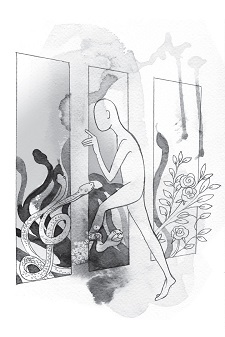 In his poem “Choices”, he talks about ‘cleaner choice’ that is nothing else but Sartre’s ‘authentic choice’ that gives a unique sense and meaning and purpose to life. About this choice he writes:
In his poem “Choices”, he talks about ‘cleaner choice’ that is nothing else but Sartre’s ‘authentic choice’ that gives a unique sense and meaning and purpose to life. About this choice he writes:
The selection one makes
Results in the life one lives
It is never too late
To make a cleaner choice (“Choices”, Wanderer. p.141).
When the thing is related to the social aspect of life, Wanderer directly or indirectly reveals that nothing related to human life could escape his eyes. Both the small currencies and the great notes of human life have been given a great place and position in this collection of poems. He (whether poet or mystic) is impartial to all— whether the thing is related to virtue or vice. He writes or utters what he feels and observes. No secrecy. No veiling. Mirroring the contemporary society, he performs the duty of a true poet or a true wanderer. He not only is conscious of the things like pain, failure, desire, forgiveness, duty, ennui, and karma etc., but also has defined them well and expressed concisely. The way in which he presents these big notes and small currencies of human society is praise-worthy. For instance, describing ‘suffering’, he says that ‘it (suffering) is an essential criterion to progress (ln.1,p.149), while ‘failure’, an effect of a cause (lns.5-6,p.151).To him ‘desire’ is nothing but a ‘love yearns to blossom gracefully like a blooming vale (lns.,1-2,p.169)’, while for ‘Forgiveness’ he says that it’s ‘better seek refuge in the virtue of reconciliation (lns.10-12, p.145). Defining ‘duty’, he writes that it must be rightly performed whether it is ‘peace or tumult’ (lns.3-4,p.111), while ‘Karma’ is nothing but ‘the result of every action (L.12,p.109)’. Further the wandering mystic refers ‘ennui’ as ‘a product of one’s incompetence to be calm (lns.5-6,p.71)’.—i.e., this type of Rajender’s presentation of the things may remind one the subject matter of Francis Bacon’s essays and his aphoristic style of presentation.
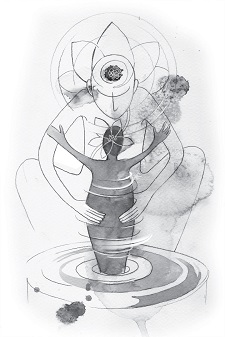 It is his social awareness that forces him to write about the real aim of learning or education—as in the poem “Learning Matters”, he writes:
It is his social awareness that forces him to write about the real aim of learning or education—as in the poem “Learning Matters”, he writes:
Transforming the learning
Into knowledge and wisdom
And to skillfully apply in
Their work-a-day life, is the
Challenging onus of the pupils
Successful achievement
By an apprentice is the
Reverent and profound response
To the trainer, who celebrates
In ecstasy for the job well-done (“Learning Matters”, Wanderer.p.99).
It is his social awareness that forces him to pick his pen up to raise a voice against the tendencies related to marriage. To a modern man, as it seems, marriage is nothing but a means of fulfilling lustrous desires. They have no sense for the holiness of the marriage. Divorce has become common. Changing life-mates is like the changing of clothes for the men of contemporary society. Marriage has become a burden to them. It is momentary and transitory like the bubbles of the rainy water.
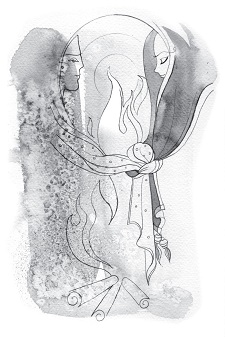 Seeing all these vices of people’s mind and heart, in the poem “Marriage”, he writes:
Seeing all these vices of people’s mind and heart, in the poem “Marriage”, he writes:
Wedding is not a chancy affair
Like the tossing of a coin
It is a lifelong commitment,
A practice of caring and sharing,
… … …
Weathering the seasons in unison
Resolving the rifts, regularly
By counting the blessings and
Celebrating the sacred ritual
Of awaking together gratified,
Until the final curtain is drawn. (“Marriage”, Wanderer.p.173).
The universality of spirituality in literature is known to all. There are only two things of consideration in each and every literature of the world. The first thing of consideration is whether they posses spirituality, while the second thing is of its lack. It is not strange, but great thing that the literature substitutes religion, and religion literature. This is the reason why T.S. Eliot in A Dialogue on Dramatic Poetry (1928) writes: “Our literature is a substitute for religion, and so is our religion” (p.32). Now, when a glance is put over Wanderer to see whether it possesses or lacks spirituality, it becomes clear that it is brimming with it. Wanderer is nothing but the musings of a wandering mystic who has the psyche of a metaphysician, and the look of a meditative sage and seer with a philosophical and metaphysical propensity. Enchanting the songs and shlokas of human vibes with the aim of exploring the existential truths in this absurd universe, is the only profession of this JOGI. When a glance over the spirituality is cast, it is found that he believes in the existence of a ‘Higher Self’ that is greater than the ‘Self’ of human beings.
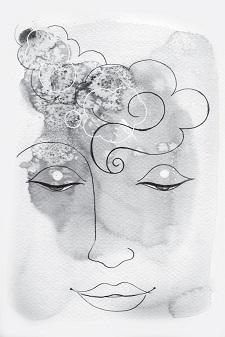 The mystic or Wanderer also talks about the formless ‘Higher Self’. In the verse “View” the poet writes:
The mystic or Wanderer also talks about the formless ‘Higher Self’. In the verse “View” the poet writes:
That what is formless
Is yet the only eternal form
Searching which
The anxious wanderer
Walks with protruding eyes
While the formless rests within
No wonder, the mystic meditates
Tranquil with dropped eyelids
Oblivious to the transient spectacle (“View”, Wanderer.p.31).
The three things that are the pillars of spirituality, and with which it is formulated, are relationship, values and the purpose of life. The aspect of relationship deals with the relationship of the selves— internal and external. Dealing with ‘oneself’, the internal self nurtures the relationship of ‘one-self’ with ‘Higher-self’, while the external self relates, supports and interacts with self of the mass living in this universe. All these things of relationship are indirectly described in the poem “Tree of Life” in which Wanderer, the mystic says:
As the tree of life
Though seemingly whole
I silently persist
In clinging to earth
For sustenance and power
To realize the eternal glory
Of the cycle of changing seasons (“Tree of Life”, Wanderer.p.199).
Where the aspect of values in spirituality is related to the kindness and compassion of the soul, caring, loving and helpfulness of the nature, and honesty of the individual, there the purpose of life is related to the setting of the beliefs that make life meaningful. Unanimously, these qualities give peace, harmony and joy to the world. Something like this, the poet says in the poem “Cordial” when he writes:
You write, I recite
You compose, I describe
You decide, I abide
It is so comfortable
To live together, in harmony,
With all these differences
Cheers! (“Cordial”, Wanderer.p.35).
Sometimes, the mystic of Wanderer is a wanderer into life, but for a little time, he is a wanderer from life. It is the bitter realities of mundane life, selfish political conditions, cross-casualties of life, natural calamities and disasters, absurdity of the cosmos, as well as time and coincidence that force him to be a wanderer from life, i.e., to be an escapist. He does not live in the real world of the mortals, but dreams, wishes and fantasies instead. His world becomes the world of fictions, fancies, and imaginations where dwelt nothing but endless sighs, pining visions, unfulfilled desires, and forbidden hopes. It is his wandering from life that moves him towards poetic composition, towards spirituality, towards nature, towards revolt, towards criticism, and towards melancholy. For instance, in the poem “Creativity”, the wandering mystic wishes to move towards poetry to end up the embracing duality of life and soul. Although such a shifting of his soul is also a kind of wandering from life, it indirectly supports Wanderer’s wandering into the life with firm hands. He says:
Briefly, comes face to face
With what is the formless,
Limitless and endless.
Having experienced such a
Transcendence, the poet
Aiming to articulate the infinite,
Ends up embracing duality,
To give birth to poetry (“Creativity”, Wanderer.p.48).
Spirituality is also a kind of wandering from life—sometimes from the inauthentic-self towards authentic-self, sometimes from ignorance towards knowledge, sometimes from the miseries of life towards the bliss of paradise. Cowards, idles and imposters are its exception. For they wear the robes or identity of a mystic to hide their cowardice, their lethargy and their real character for self-indulgences. The mesmerizing point is this whenever the mystic thinks to move towards spirituality, it is not only for the welfare of his soul and the search of the unknown but also for the bitter truth of life in which the entrapped mass is crying. His wandering reminds the wandering of Lord Buddha who left his best— his palace, his queen, his prince etc — to discover the bitter truth of life and to set the mass free from the cycle of birth and death. Wanderer does the same thing. Whether his action differs or not, but the intention is same. In the poem “Reverence” the mystic wanderer says:
Thus I bow in reverence
To anything that brings
My journey closer
To the unknown (“Reverence”, Wanderer.p.89).
History, whether of Hindi or English, is the witness of the fact that the British poets of the Romantic Era (19th C.) and the Indian (Hindi) poets of Chhayavaad (19th C.) move towards nature and vice versa, when they wander from the mundane life of their society. Here too, the poet who is disguised as wanderer or the mystic, wishes to move towards nature and vice versa, when he is dissatisfied with the life that he sees and observes on this earth. How confidently he says!
When one is aware
Of being in the lap
Of Mother Earth
One feels blessed (“Reverence”, Wanderer.p.89).
Melancholy, revolt and criticism seem to have distant relationship, but they have the same ground and roots. Generally, it is seen that when a person is physically weak to revolt against someone or something, he becomes melancholic by nature and begins to criticise (satirise) the person or thing with a set target. This criticism may be formal or informal, forceful or feeble, but its existence can’t be denied. The mystic in Wanderer is no exception. Feeling his onus, he revolts against the vices and follies prevailing in the society. He, like Alexander Pope, Jonathan Swift, Ben Jonson, and John Dryden, satirises them profoundly with ennui and melancholy in his heart with the aim of bringing change on this blue planet. For instance, in the poem “New Era”, Wanderer, the mystic while criticising the role played by the ruling leaders throughout the globe for their negligence of the mass who were in moil and misery due to the invisible forces of Corona, says:
The leadership globally
Appears gullible and foolish
Trying to rule whimsically
Without having capability
Of knowledge of governance
Surrounded by another
Set of fools, who play
Sycophant to such rulers
And lavish praises on their idiocies (“New Era”, Wanderer.p.223).
While going through the present collection of poems, when the subjective and objective aspects of Wanderer are observed, it is found that hitherto every road to objectivity passes via subjectivity. The world of the literary scholars is not unknown to the fact that there is a little difference between the subjective and objective poetry. Thoughts, feelings, and emotions of any poet do not make any poetry subjective or objective. Only—only the handling of the subject matter does so. In Wanderer, whenever Rajender describes a memorable deed or incident, he brims it with his personal thoughts, feelings and emotions maintaining complete detachment. He gives importance to the experiences of his heart and mind rather than the experiences of his eyes and ears. He tries to treat the subject objectively and dispassionately, keeping in mind— as it seems— T.S. Eliot’s ‘theory of impersonality’. This poetry collection reminds “Dover Beach” in which Matthew Arnold presents subjective elements handling objectively. If ‘one’ from the various stanzas of the poems of this collection (Wanderer) is removed, and ‘I’ is added, they naturally become subjective, i.e., the poet has tried his best to make this collection of poetry objective but the glimpse of the subjective elements is natural. They can’t be neglected. Subjectivity or objectivity of a poem does not make a poem sublime. The handling of the subject makes the difference. Undoubtedly, Wanderer is a fine example of both subjective and objective elements of poetry. The existence of objectivity here depends on subjectivity.
In a nutshell, it can be said that there neither is, nor can be found any hiatus for the various shades of life in Rajender Krishan’s Wanderer. These shades of life are making wanderer wander sometimes into life, and sometimes from life. His existence and essence depend on these shades. His nimbleness rests on them. His (Ramta Jogi’s) condition is like a ship that is entangled between two different tidal waves—wanderer into life, and wanderer from life— in a stormy ocean. The mighty wave carries him away with it. The weaker wave waits for its chance carefully. Whenever the former gets weaker, there is good chance for the latter. These two waves of oceanic life take their turn one by one. For a while, floating along with the rising wave helplessly, Wanderer cries in misery bitterly, and with the falling waves, he sighs on and on with his broken heart, but the world that is ignorant of all this, thinks nothing but only his preaching. Whatever he does, does not soi-distantly, but resilience is in sound, and frankness in the tone. Tons of matters he handles, but the shades of life never become pale.
Cited Works
Web Resources
This paper was first published in the March 2022 issue of Episteme
26-Mar-2022
More by : Dr. Dharmendra Kumar Singh

|
Excellent expression. Very well put the subject and soul of content. |